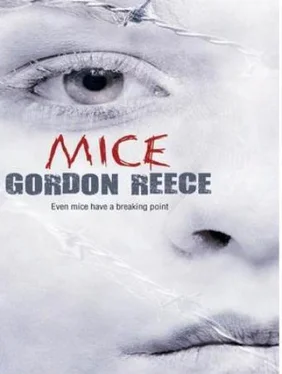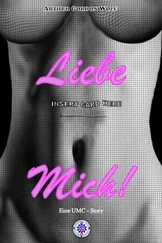At ten o’clock on the dot, my main tutor, Roger Clarke, would arrive. Roger taught me English language and literature, history, French and geography, the five subjects I was most confident of getting A grades in. Roger and I would work at the large table in the dining room, sustained by endless cups of tea, which Roger said I made so strong ‘you could stand the spoon up in it’.
Mum hadn’t been keen at first on the idea of a man coming to the house to teach me, but after she was assured he’d been thoroughly vetted, and after meeting him for herself, she relented. She must have seen that Roger didn’t pose any threat to me because Roger was a mouse too. He wore the badge of the mouse fellowship on his chest just like I did, just like Mum did, and I instantly felt a kinship with him.
He was only twenty-seven, but he’d already lost most of his hair due to a condition brought on by stress. All that remained were two hardy patches just above his ears. Perhaps to compensate, he’d grown a thick blond moustache. He was anorexically thin and wore round tortoiseshell glasses that hugely magnified his green eyes. When he spoke, his Adam’s apple bobbed up and down in his throat like a hardboiled egg. In spite of his slightly odd appearance, I felt comfortable with Roger right away, and quickly realized what a gifted teacher he was; with his softly spoken explanations, things I’d found difficult to follow at school suddenly seemed quite straightforward.
Roger and I got on really well. He was much more like a friend than a teacher. During our regular ‘concentration breaks’, he gradually told me more and more about himself. He’d got a first-class degree at university in history and then trained to become a classroom teacher. It had always been his ambition to teach — both his parents had been teachers, and he’d seen how much satisfaction and pleasure their work had given them.
For Roger, however, the reality had been very different to the fantasy. He’d found himself in a school where few of the children had any interest in learning. Because of the way he looked he was detested by the pupils, who nicknamed him the foetus. He’d had terrible discipline problems with his classes. In the five years he’d stuck it out, he’d been assaulted by pupils eleven times . His car had been keyed and the tyres punctured so often that he’d eventually sold it and walked to and from school instead — a round distance of more than four miles. He couldn’t take the bus because he was too frightened that pupils from his school might get on.
Eventually, after a pupil had headbutted him in the mouth and knocked out one of his front teeth, Roger had a nervous breakdown and was forced to resign on health grounds. When he was better he’d returned to university to write a research paper on the origins of the First World War ( one of the greatest mice massacres in history ). He’d been struggling financially, as his grant was very small, and a friend had suggested he put himself forward to the local authority as a personal tutor for those children too sick or too terrified to attend school. I was only his second pupil.
With Roger, my former reticence disappeared and I readily told him my own story: about my dad, whose sex life was more important to him than his own daughter; about the JETS and how they’d knocked me almost unconscious and then set my hair on fire.
‘It’s amazing,’ I said to him one day, ‘that I was a pupil and you were a teacher and we were both victims of school bullies.’
His brow furrowed as if he wanted to draw some distinction because of our ages, but then he smiled as if to say: What’s the use denying it when it’s true?
‘We’ve got a lot in common,’ I said.
His distorted green eyes lingered on my face. ‘Yes, Shelley, we’ve got a lot in common.’
At one o’clock we’d stop work and Roger would leave to drive back to his flat in town, never tiring of his parting quip — ‘Glad I brought a ball of wool with me or I’d never find my way back to civilization again!’
I’d prepare myself something light for lunch — a salad, usually — and sit and watch the news on TV. Mum’s caseload was so heavy that she had to work through her lunchtimes, making do with a hurriedly nibbled sandwich at her desk. While Blakely, Davis and the other partners gorged themselves at the local bistro, bragging and bellowing like the fat cats they liked to think they were, Mum sat in the empty office quietly and efficiently correcting their mistakes.
After lunch I’d burrow into whatever novel I was reading at the time, sitting upstairs on the window seat in my bedroom in that glorious lucent light. If it was warm — and there were some beautiful days that February — I’d sit outside and read, always careful to keep the scars on my forehead and neck well covered from the sun.
At two-thirty Mrs Harris, a short combative woman in her fifties with dyed orange hair, would arrive. I didn’t get on with her anywhere near as well as I got on with Roger, and this wasn’t only because she taught me maths and science, my least favourite subjects.
Mrs Harris had been teaching mice like me for years and over that time her sympathy had been completely eroded away. She’d come to the conclusion that we were nothing more than shirkers — spoilt and over-indulged children who couldn’t face up to the realities of life. I once made a remark about my scars to her, and she turned on me with derision.
‘Scars? Scars? You call those scars ? You should go down to the hospital and see what real burns look like. A bit of make-up and no one would notice your scars. That’s the problem with young people today — too vain, only think about themselves.’
I bitterly resented her attitude, but was too weak to speak up in my own defence. I felt I’d seen plenty of life’s realities — too many , in fact. I doubted Mrs Harris had, or she’d have been more understanding.
Mrs Harris would leave at four-thirty and I’d work on whatever homework I had until Mum got back at around six-thirty. If I’d finished my homework I’d practise my flute, my music stand set up beside the piano so I had a view out onto the front garden while the light lasted. If I didn’t feel like playing my flute, I’d read more, or get out my watercolours and paint. As I wasn’t very good at just making pictures up, I’d get one of the big art books down from the lounge bookshelves and copy a particularly beautiful horse or an interesting landscape. Sometimes I’d have a go at painting one of the objects on the sideboard in the dining room — the wooden bowl of potpourri, or the vase of dried flowers, or one of the many china and glass knick-knacks Mum had collected over the years. Most of these ornaments were presents to Mum from her mum (Mum had never had the heart to tell her they weren’t really her thing). They were hideously kitsch — a Beatrix Potter hedgehog, a Victorian flower girl with rosy red cheeks, a little boy fishing with a string tied to his big toe, a glass dolphin breaking the water, a miniature thatched cottage — yet, strangely, the more kitsch they looked, the more they amused us and the more attached to them we became.
It was the evenings at home with Mum in Honeysuckle Cottage that I enjoyed the most. When she got in from work, I’d make her a cup of tea and we’d sit at the kitchen table and chat. We adopted a custom we’d seen in a Michelle Pfeiffer film, The Story of Us , where a family take it in turns to describe the highs and lows of their day during the evening meal.
My highs were usually things like getting a good mark from Roger, or reading a particularly exciting chapter in my novel, or doing a painting that turned out really well. Lows were feeling depressed about the scars that still clung to my neck and forehead, or thinking about my dad and feeling angry with him for walking out on us the way he did. Mum’s highs were settling cases successfully and being praised by grateful clients; her lows usually involved the odious Mr Blakely speaking rudely to her — sometimes he even swore at her — or trying to rub up against her in the photocopying room.
Читать дальше












